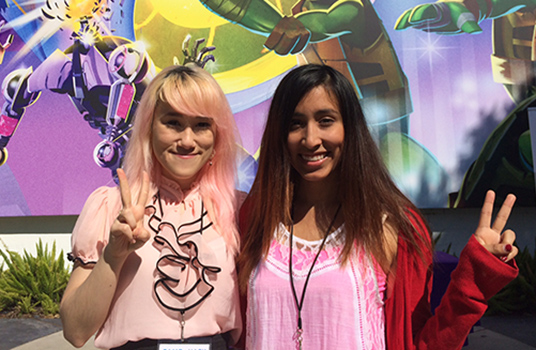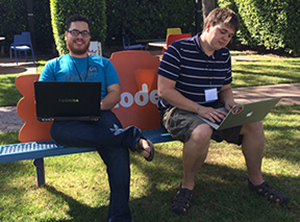Ask NASA Climate | May 22, 2014, 10:41 PDT
Hacking into youth passion

Aein Hope (left) and Priscilla Rodriguez were among the participants in the latest Game Hackathon at Nickelodeon.
Once carbon dioxide gets into Earth’s atmosphere, it will remain there for as long as a thousand years, which means that future generations will be saddled with the consequences of our current carbon emissions. As an educator, I sometimes wonder whether we’ve properly prepared young people to face what we’ve left behind for them. Have we passed on the right tools and skills to those who will be most impacted by the decisions they didn’t make?
This is especially important for the current crop of students, who have grown up with standardized testing, have come to believe there is a “right answer,” are passive receptors of an instructor who knows everything, and think their job is to simply memorize and regurgitate facts.
Confronting the challenges of climate mitigation and adaptation is going to ask for more of future generations than memorization or finding the solution. Furthermore, being obsessed with the “right answer” and searching for the solution inhibits our ability to come up with creative solutions to complex problems and makes us vastly underprepared for real-world situations. In fact, I’m uncomfortable with using terms such as "solution" when discussing climate change, as though it can be solved like a math equation or a puzzle that has specific right or wrong answers.

I met a number of these young people when I mentored at a Game Hackathon, an educational social event where new enthusiastic computer programmers and software developers collaborate intensively on creative technology projects – basically, bunches of 20-somethings stay up all night for the whole weekend, honing their programming skills and experimenting with new technology. Since JPL is an industry leader in emerging technology trends, and since the event was held at Nickelodeon (bicycling distance from my home), I went along, hoping to share my expertise and learn.
Rows of tables equipped with power cords, Internet hotspots and other basic hardware were set up and young people gathered in groups to focus on collaboration, team building and creativity.
Aein Hope and Priscilla Rodriguez told me that this was their third Hackathon, and explained that they were passionate about learning and exploring rather than achieving a specific goal or outcome. I found their attitude a refreshing antidote to the usual “Do I have to know this for the test?”
I also met another team of enthusiastic participants, Ricardo Aponte and Nathan Taylor, whose focus was on teamwork. So, although there’s no teacher, book or website that can perfectly prescribe how to tackle climate mitigation and adaptation, I left the event buoyed by a sense of optimism. With programs like these, there’s hope that young minds might gain the tools, skills and teamwork that their generation will need to work together to address many of the world's problems.
Thank you for your comments; they are always appreciated.
Laura
